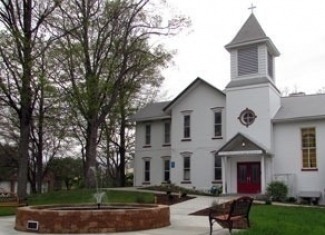May 2015
Facing Leadership Challenges
Preparing for Lay Only Leadership
Parishes are closing all over the country. As communities of faith dwindle in size and enthusiasm, the money may no longer be there to pay a clergy person or support the building.
But, does a lack of money have to mean closing the church?
The experience of two small Michigan churches suggests it doesn’t. Michigan has a struggling economy and many areas that have no influx of population (and often a dwindling one). However, there are people who still live, work, and thrive in areas across the state. They are passionate about their faith and their churches. They have a community of believers who meet weekly for worship and gather throughout the week for fellowship and study.
St. Andrews by the Lake in Harrisville
My favorite example of this is the Episcopal Church in a town called Harrisville.
The congregation has gone through a "mutual ministry development" process, but even if they hadn't, they would still be maintaining - as do several other northern parishes that are tiny and lay-led and just don't have people and won't get people because of geography. Harrisville has an active core of people who are invested in supporting each other and reach out into their community. They are really passionate about the Humane Society and spend a good amount of effort with the local food bank.
Paid, seminary trained clergy isn’t an option because of the lack of parish resources and lack of personnel options in the area. But they worship, study, and support each other. Here’s how they describe themselves on their website: “St. Andrews is a caring Episcopal congregation that works! We help our members find ways to fulfill their baptismal promises to seek and serve Christ in all persons. We do not employ a full time priest. By the grace of God we are a self-sufficient congregation. The Mutual Ministry Team members are here to serve as priests and evangelists. If you are seeking a way to do Christ’s work in your life, please join us.”
Trinity Episcopal Church in Flushing
By the fall of 2013, it was clear that Trinity Episcopal Church in Flushing, Michigan would no longer be able to afford full-time clergy. The congregation, a strong community who cared for one another and valued each other, also had the gift of being truly welcoming to visitors. When someone comes to church, they’re greeted appropriately: Visitors are warmly welcomed and guided as needed, without being overwhelmed. Each guest is given a mug, information about Trinity, and invited to coffee hour – which is often a light meal and table conversation. Church members encourage visitors to talk about themselves, what led them to Trinity, and if they are seeking something specific in a faith community. When visitors leave, they often report feeling welcomed and included, even if they are passing through town or don’t find the Episcopal Church to be what they are looking for as their church “ home.” Those who do return, cite the welcome of their first visit as a major reason to return.
Equipping lay leaders for a different model
Through my work with these and other congregations in the Episcopal dioceses of Spokane, Eastern Michigan, and Western Michigan, I've come to realize that these struggling faith communities can do good things themselves. Even when they can't afford full, or sometimes even very part time, clergy, they can maintain faith communities that support each other and the wider community.
This change, from a clergy-led church to one where lay leaders are equipped and prepared to assume the main leadership roles inherent in an Episcopal parish is both a very ancient and a very postmodern approach to Church. Our first leaders were not trained for years in the “right way to do things” but they were passionate about sharing the Good News that Jesus had brought to them.
So, how do we equip lay leaders in these congregations to change their culture from a clergy-centered system to a lay leadership-centered faith community? What role could I, a priest, play?
Coaching through change
After my experience with a variety of ministries and parishes, I started looking at how my skills and experience could serve the parishes in my present diocese of Eastern Michigan. In consultation with the canon to the ordinary, I explored ways I might serve declining parishes that could help ease the transition from a clergy-led congregation to a self-leadership model. Could my teaching skills combined with my parish ministry experience be used to help faith communities navigate the road ahead? And, at the same time could this experience lead to a model – or resources – to share with others?
Trinity Episcopal Church in Flushing was my first assignment in this new role. Having recognized that they would no longer be able to afford full-time clergy, and doubtful, due to local demographics, they would be able to attract part-time clergy, we got to work planning the transition from what had been to whatever was next.
My goal in our time together was to help them strengthen this community bond and work with the leadership on several key topics, centered on preparing Trinity’s leaders and members to do what they would need to do to continue to be a faithful community.
Learning new roles
During our time together, I was coach and consultant and resource. I did the normal Sunday clergy pieces of leading worship and preaching. Outside of worship, I would partner with the leaders of the different ministries.
I started by asking, “What do people need to know to run an Episcopal church? How do they structure themselves to continue ministry with one another?” Once the lay leaders and I started working together, we were able to assess their current structure and see what pieces were lacking. We celebrated those things that were going well, and started building the structure to help them continue on their journey together.
One of the first areas we looked at was worship. Who would do the worship planning, create the bulletins, and ensure Eucharist resources were on hand? Given the likelihood that Trinity would be served by part time or supply clergy, what would happen to Morning Prayer? One parishioner was already a trained worship leader; an invitation to participate in the training offered by the diocese was extended to members who might be interested in this ministry. Two members indicated interest: one was trained during the time I was at Trinity and the second became certified after I left.
We also looked at the church office, where the primary functions included preparing weekly service bulletins, answering the phone, sorting mail, and managing church finances. After evaluating options, the decision was made to move forward without a paid church secretary and instead restructure the office around a core of office volunteers and Plan Bede, an organization that creates weekly service bulletins, which are then copied by volunteers. Office volunteers also sort the mail. The church phone number was transferred to a cell phone, monitored by a team of parishioners who take turns answering it and forwarding messages to the appropriate person for a response. Trinity also recruited a volunteer business manager, reporting to the vestry and treasurer, who makes sure budgets are in place, bills are paid, and required financial reporting is completed.
Also on our list? Christian education. Pastoral care. Community Engagement. Maintenance. During our time together, each area was reviewed. Plans were made.
Key to all of this is identifying the work that needs to be done, and having a core of committed volunteers willing to take, not only this responsibility, but also training for new areas of responsibility.
What we learnedTrinity’s vestry, other leaders, and parishioners worked together to build up a stronger community of faith. They explored what it means to be a parish in the Episcopal Church, celebrated things that were going well and the many gifts being shared, and were ready to look to the future. While they were unsure of what clergy might be there for support, they knew that they had the skills and knowledge to be a community of love and hospitality.
Trinity is not alone in this journey of unknowing. It is scary to face an unknown future when it seems there are no or very limited options. If you are going through a similar transition, I encourage you to find a partner or a coach. Gather your community around, make a list of things that you are doing well and the values that you hold, and claim them! Then, offer them over to God and invite the Holy Spirit to move through your community. God’s power and your hard work can make amazing things happen!
Heather Barta is a priest in the Episcopal Diocese of Eastern Michigan. She currently serves at St. Jude’s Episcopal Church in Fenton.
Try This
Running any organization, including a faith community, requires paying attention to a number of areas. What are the key areas essential to the smooth running of your faith community? Does your list include everything done by your clergy? Does your congregation’s procedures and policy manual include ‘how to’s’ for all items on your list? If not, please consider taking steps to update your manual to include the missing areas.
Resources
- Born of Water, Born of Spirit: Supporting the Ministry of the Baptized in Small Congregations by Sheryl Kujawa-Holbrook& Fredrica Harris Thompsett, Alban; 2010. This book shares the findings of a study of small churches and the ways in which they used the gifts of all the members of the congregation to create vital communities, with or without the benefit of regular clergy presence.
-
Congregational consultants:
Some Episcopal dioceses offer consulting services including: Massachusetts, Newark, Oregon, Olympia (Western Washington), and New Jersey
Congregational Consulting Group (formerly part of the Alban Institute)
-
I Have Called You Friends… by Kevin Thew Forrester, Church Publishing, 2003.
Forrester draws on his experience of working with mutual ministry in the Episcopal Diocese of Northern Michigan to express how each member of a congregation is called to ministry.
- Plan Bede worship
- St. Andrew’s Episcopal Church, Harrisville, Michigan
- Trinity Episcopal Church, Flushing, Michigan
Don't miss an issue of Vestry Papers! Sign up for your free subscription here.






